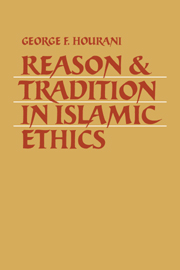Book contents
- Frontmatter
- Contents
- Preface
- Foreword by Michael Marmura
- Conventions
- Titles and locations of the original articles
- Introduction
- 1 Islamic theology and Muslim philosophy
- 2 Ethics in classical Islam: a conspectus
- 3 Ethical presuppositions of the Qurʾān
- 4 ‘Injuring oneself’ in the Qurʾān, in the light of Aristotle
- 5 Two theories of value in early Islam
- 6 Islamic and non-Islamic origin of Muʿtazilite ethical rationalism
- 7 The rationalist ethics of ʿAbd al-Jabbār
- 8 Deliberation in Aristotle and ʿAbd al-Jabbār
- 9 Ashʿarī
- 10 Juwaynī's criticisms of Muʿtazilite ethics
- 11 Ghazālī on the ethics of action
- 12 Reason and revelation in Ibn Ḥazm's ethical thought
- 13 The basis of authority of consensus in Sunnite Islam
- 14 Ibn Sīnā's ‘Essay on the secret of destiny’
- 15 Averroes on good and evil
- 16 Combinations of reason and tradition in Islamic ethics
- Select bibliography
- Index
- Frontmatter
- Contents
- Preface
- Foreword by Michael Marmura
- Conventions
- Titles and locations of the original articles
- Introduction
- 1 Islamic theology and Muslim philosophy
- 2 Ethics in classical Islam: a conspectus
- 3 Ethical presuppositions of the Qurʾān
- 4 ‘Injuring oneself’ in the Qurʾān, in the light of Aristotle
- 5 Two theories of value in early Islam
- 6 Islamic and non-Islamic origin of Muʿtazilite ethical rationalism
- 7 The rationalist ethics of ʿAbd al-Jabbār
- 8 Deliberation in Aristotle and ʿAbd al-Jabbār
- 9 Ashʿarī
- 10 Juwaynī's criticisms of Muʿtazilite ethics
- 11 Ghazālī on the ethics of action
- 12 Reason and revelation in Ibn Ḥazm's ethical thought
- 13 The basis of authority of consensus in Sunnite Islam
- 14 Ibn Sīnā's ‘Essay on the secret of destiny’
- 15 Averroes on good and evil
- 16 Combinations of reason and tradition in Islamic ethics
- Select bibliography
- Index
Summary
Islamic ethics should be of interest to Muslims and non-Muslims alike in two aspects. The first is its central place as the core of Islam, if we can include Islamic law as an integral part of ethics. The Qurʾān repeatedly uses the phrase ‘those who believe [in God] and do good works’, taking it for granted that these two attributes belong to the same group in extension, and that the first is a prerequisite of the second – but also that the first would be insincere and not true belief without the second. Following this lead, the legal profession in the first two centuries of Islam tried to make the law of the sharīʿca cover every ethical situation and to make the study of this law the culminating study in Islamic education. Thus, since Islamic education was the most formative element in Islamic civilization, the important rôle of ethics in this civilization becomes obvious.
The second aspect of interest lies in the theological and philosophical theories that were constructed to support normative ethics. These theories all belong to the main Western lines of rational theology and philosophy and have little relation to the theologies and philosophies of East Asia. This relation to Western intellectual history has, unfortunately, rarely been recognized in the West. As a result, Islamic thought has been generally neglected and ignored in Western histories of theology and philosophy.
- Type
- Chapter
- Information
- Reason and Tradition in Islamic Ethics , pp. 1 - 5Publisher: Cambridge University PressPrint publication year: 1985



